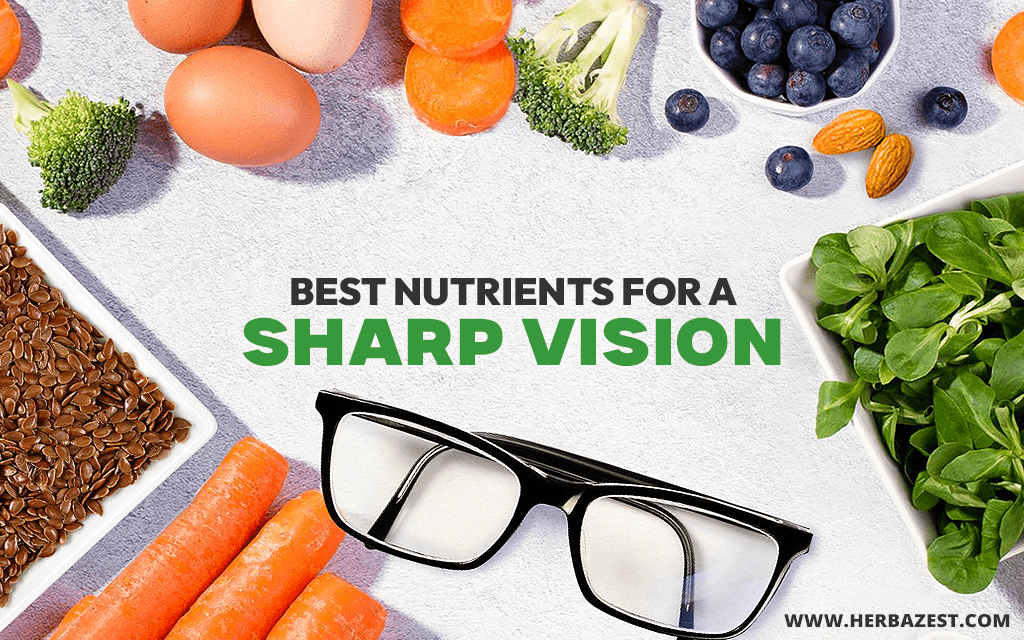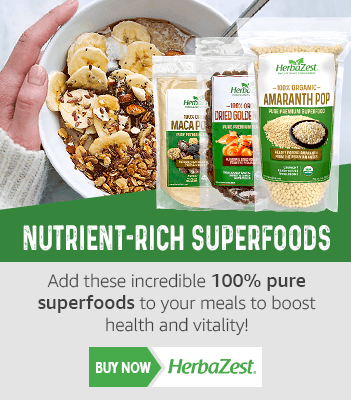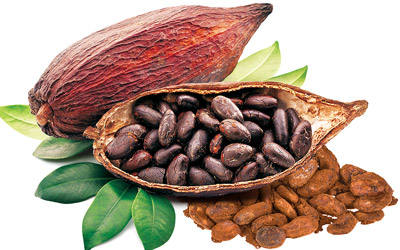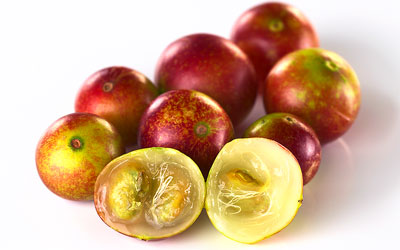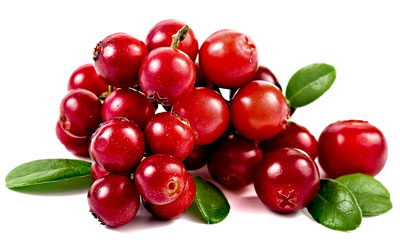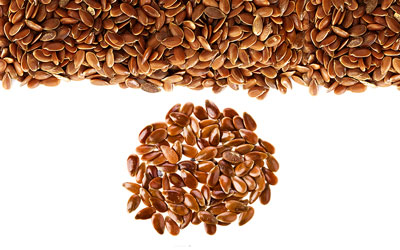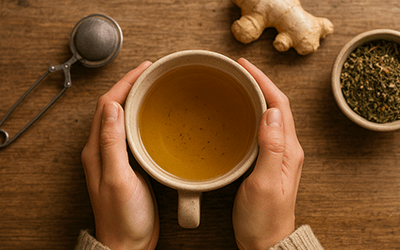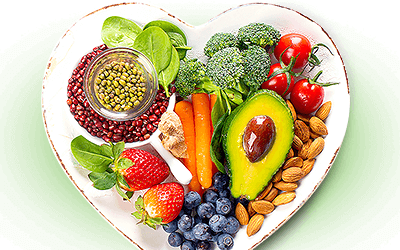Eye problems usually develop gradually as part of the aging process. They become more noticeable over time, when people start struggling with reading road signs, sewing, cooking, or even identifying familiar people at a distance on the street. More than 250 million people around the globe are affected by a variety of visual impairments.1
Presbyopia is more common in adults around the age of 45 and older, while age-related macular degeneration (AMD), cataracts, and diabetic retinopathy are the leading causes of vision impairment the U.S., and are most common in those over the age of 65. Some of these eye problems can be corrected with eyeglasses, contact lenses, or surgery. However, scientific data suggests there are natural ways to maintain sharp vision as we get older, and diet has a lot to do with that.
Nutrition for Eye Health
According to science, a high-quality diet is a decisive factor for keeping sharp eyesight over the years. These are the most important nutrients for eye health:
Vitamin A
Vitamin A is among the most popular vitamins for eye health. This fat-soluble compound is produced by the body using carotenoids (fruits and vegetables) and retinols (animal sources); both groups are essential for healthy vision. Two pro-vitamin A carotenoids, namely lutein and zeaxanthin, have been shown effective at preserving visual acuity, and can be easily obtained from a diet rich in green leafy vegetables, such as kale, spinach, and broccoli as well as in fruits, like aguaje, bilberry, and goji berry.
Vitamin C
Vitamin C is a powerful antioxidant that protects the entire body from free radical damage. In the case of the eyes, vitamin C does a great job at minimizing the damage caused from UV light exposure, and it has been shown to delay the onset of cataracts by preserving eye lenses' integrity over time.2 Besides
lemons and oranges, some of the best natural sources of vitamin C are camu camu, kiwi, red bell pepper, and guava.
Vitamin E
This fat-soluble nutrient, mainly in its alpha tocopherol form, has proven to be essential for eye health. It targets the free radicals that attack fatty acids in the retina, preserving the eye's cellular integrity and preventing macular degeneration.3 Vitamin E is abundant in nature and can be easily obtained from nuts and seeds, such as almonds, hazelnuts, peanuts, and pumpkin seeds as well as from vegetable oils from sunflower, safflower, and soy beans.
Zinc
It has been shown that zinc plays an important part in eye function, being significantly present in ocular tissues, particularly in the retina and the choroid (the middle layer of the eye's wall). Thanks to its interaction with taurine and vitamin A, zinc not only acts as an antioxidant agent, but it also regulates the reaction to light and the transmission of synaptic impulses, all good reasons to ensure an adequate supplementation of this trace mineral. While zinc can be found in red meat and poultry, some of the best vegetable sources of the mineral are nuts and seeds, such as cashew nuts, sesame seeds, and pumpkin seeds as well as cereals and legumes, like quinoa, rye, wholegrain rice, lentils, and beans.
Omega-3 Fatty Acids
Years of research suggest that long-chain polyunsaturated fatty acids (LC-PUFAS) may have some influence on eye health. Omega-3 fatty acids have been shown to protect retinal cells and prevent oxidation as well as relax blood vessels, which lowers internal eye pressure and helps prevent glaucoma.4 Ophthalmologists around the world recommend obtaining adequate levels of omega fatty acids from food and supplements. Red meat, fish, and poultry are rich in omegas, whereas great vegan sources are flaxseed, sacha inchi, and walnuts.
Resveratrol
It may come as a surprise, but preliminary studies have shown that resveratrol may be able to prevent retinal damage caused by UV light exposure.5 This can be useful in preventing ocular disorders - like macular degeneration - for maintaining healthy, lifelong vision. Resveratrol is abundant in nature and can be found in berries, such as grapes, blueberries, and cranberries as well as in peanuts, pistachios and cacao.
Taurine
This one may not sound as familiar as the above mentioned nutrients, but taurine is a powerful antioxidant that protects retinal membranes. Scientific research has revealed its important role in the prevention of ocular neurodegenerative diseases, such as glaucoma, age‐related macular degeneration, and diabetic retinopathy. Taurine is particularly abundant in animal sources, mainly shellfish, poultry, and red meat, but it is also present in seaweed and legumes, such as beans, lentils, soy products, and whole grains.
While a certain amount of vision degeneration is a normal part of aging, its is perfectly possible to keep sharp vision by developing health habits like eating a balanced diet, using medicinal herbs, wearing sunglasses to block harmful UV radiation from direct sunlight, and investing in a wide-brimmed hat to reinforce this protection. At the first signs of impaired vision, worsening strain, or eyelid swelling, an immediate consultation with an eye doctor is strongly recommended. Eyesight is precious and should not be taken for granted.
Sources
- Centers for Disease Control and Prevention, Common eye disorders
- Clinical Interventions in Aging, Nutrients for thr aging eye, 2013
- CNS Neuroscience & Therapeutics, Taurine and oxidative stress in retinal health and disease, 2021
- Graefe's Archive for Clinical and Experimental Ophtalmology, Resveratrol and the eye: activity and molecular mechanisms, 2014
- Journal of the American College of Nutrition, Zinc and the eye, 2001
- National Institute on Aging, Aging and Your Eyes
- National Institutes of Health, National Eye Institute, Refractive Errors
- Nutrients, The effect of lutein on eye and extra-eye health, 2018 | Nutrition and Eye Health, 2019 | The Role of Resveratrol in Eye Diseases—A Review of the Literature, 2022
- Nutrition Reviews, Potential roles of dietary zeaxanthin and lutein in macular health and function, 2023
- Oxidants and Antioxidants in Medical Science, Zeaxanthin as a Powerful Carotenoid for Eye Health, 2023
- Progress in Retinal and Eye Research, The role of omega-3 long-chain polyunsaturated fatty acids in health and disease of the retina, 2005
- University of Pittsburgh, Department of Ophthalmology, What is Vision Impairment?
- World Health Organization, Blindness and vision impairment, 2023
Footnotes:
- The Lancet Global Health. (2017). Global causes of blindness and distance vision impairment 1990-2020: a systematic review and meta-analysis. Retrieved April 15, 2024, from: https://pubmed.ncbi.nlm.nih.gov/29032195/
- Nutrients. (2020). Vitamin C and the Lens: New Insights into Delaying the Onset of Cataract. Retrieved April 15, 2024, from: https://www.ncbi.nlm.nih.gov/pmc/articles/PMC7602486/
- Frontiers in Neuroscience. (2022). Molecular Mechanisms Underlying the Therapeutic Role of Vitamin E in Age-Related Macular Degeneration. Retrieved April 15, 2024, from: https://www.ncbi.nlm.nih.gov/pmc/articles/PMC9114494/
- Translational vision science & technology. (2018). Oral Omega-3 Supplementation Lowers Intraocular Pressure in Normotensive Adults. Retrieved April 15, 2024, from: https://www.ncbi.nlm.nih.gov/pmc/articles/PMC5931260/
- The American Journal of Pathology. (2010). Resveratrol Prevents Light-Induced Retinal Degeneration via Suppressing Activator Protein-1 Activation. Retrieved April 15, 2024, from: https://pubmed.ncbi.nlm.nih.gov/20709795/

